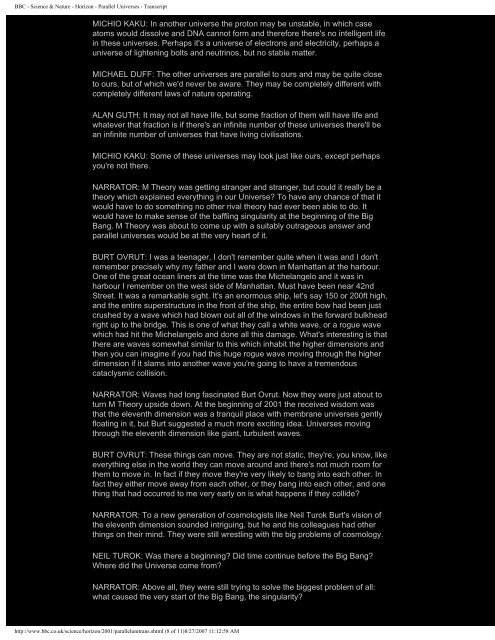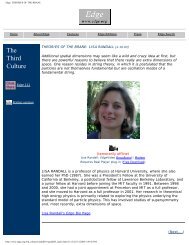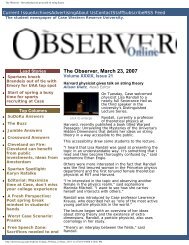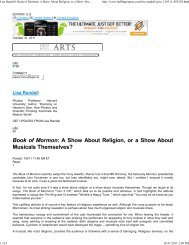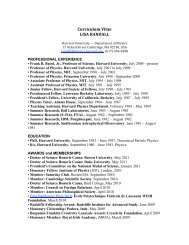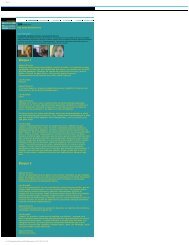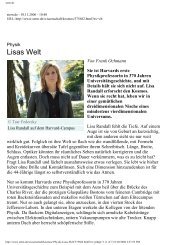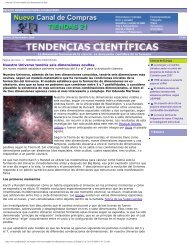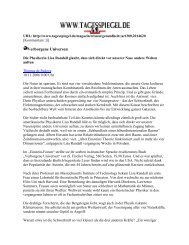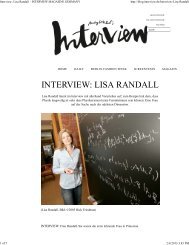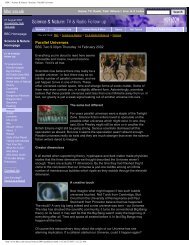BBC - Science & Nature - Horizon - Parallel Universes - Transcript
BBC - Science & Nature - Horizon - Parallel Universes - Transcript
BBC - Science & Nature - Horizon - Parallel Universes - Transcript
- No tags were found...
Create successful ePaper yourself
Turn your PDF publications into a flip-book with our unique Google optimized e-Paper software.
<strong>BBC</strong> - <strong>Science</strong> & <strong>Nature</strong> - <strong>Horizon</strong> - <strong>Parallel</strong> <strong>Universes</strong> - <strong>Transcript</strong>MICHIO KAKU: In another universe the proton may be unstable, in which caseatoms would dissolve and DNA cannot form and therefore there's no intelligent lifein these universes. Perhaps it's a universe of electrons and electricity, perhaps auniverse of lightening bolts and neutrinos, but no stable matter.MICHAEL DUFF: The other universes are parallel to ours and may be quite closeto ours, but of which we'd never be aware. They may be completely different withcompletely different laws of nature operating.ALAN GUTH: It may not all have life, but some fraction of them will have life andwhatever that fraction is if there's an infinite number of these universes there'll bean infinite number of universes that have living civilisations.MICHIO KAKU: Some of these universes may look just like ours, except perhapsyou're not there.NARRATOR: M Theory was getting stranger and stranger, but could it really be atheory which explained everything in our Universe? To have any chance of that itwould have to do something no other rival theory had ever been able to do. Itwould have to make sense of the baffling singularity at the beginning of the BigBang. M Theory was about to come up with a suitably outrageous answer andparallel universes would be at the very heart of it.BURT OVRUT: I was a teenager, I don't remember quite when it was and I don'tremember precisely why my father and I were down in Manhattan at the harbour.One of the great ocean liners at the time was the Michelangelo and it was inharbour I remember on the west side of Manhattan. Must have been near 42ndStreet. It was a remarkable sight. It's an enormous ship, let's say 150 or 200ft high,and the entire superstructure in the front of the ship, the entire bow had been justcrushed by a wave which had blown out all of the windows in the forward bulkheadright up to the bridge. This is one of what they call a white wave, or a rogue wavewhich had hit the Michelangelo and done all this damage. What's interesting is thatthere are waves somewhat similar to this which inhabit the higher dimensions andthen you can imagine if you had this huge rogue wave moving through the higherdimension if it slams into another wave you're going to have a tremendouscataclysmic collision.NARRATOR: Waves had long fascinated Burt Ovrut. Now they were just about toturn M Theory upside down. At the beginning of 2001 the received wisdom wasthat the eleventh dimension was a tranquil place with membrane universes gentlyfloating in it, but Burt suggested a much more exciting idea. <strong>Universes</strong> movingthrough the eleventh dimension like giant, turbulent waves.BURT OVRUT: These things can move. They are not static, they're, you know, likeeverything else in the world they can move around and there's not much room forthem to move in. In fact if they move they're very likely to bang into each other. Infact they either move away from each other, or they bang into each other, and onething that had occurred to me very early on is what happens if they collide?NARRATOR: To a new generation of cosmologists like Neil Turok Burt's vision ofthe eleventh dimension sounded intriguing, but he and his colleagues had otherthings on their mind. They were still wrestling with the big problems of cosmology.NEIL TUROK: Was there a beginning? Did time continue before the Big Bang?Where did the Universe come from?NARRATOR: Above all, they were still trying to solve the biggest problem of all:what caused the very start of the Big Bang, the singularity?http://www.bbc.co.uk/science/horizon/2001/parallelunitrans.shtml (8 of 11)8/27/2007 11:12:58 AM


